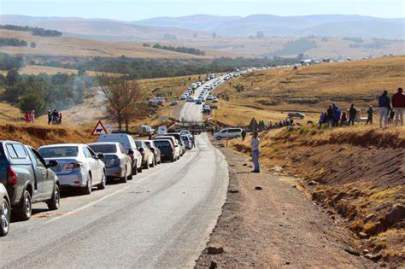Ukraine War: 'Mad panic' as Russia evacuates town near Zaporizhzhia

Russia has sparked a "mad panic" as it evacuates a town near the contested Zaporizhzhia nuclear power plant, a Ukrainian official says.
Russia has told people to leave 18 settlements in the Zaporizhzhia region, including Enerhodar near the plant, ahead of Kyiv's anticipated offensive.
The Ukrainian mayor of Melitopol, Ivan Fedorov, said there were five-hour waits as thousands of cars left.
The UN's nuclear watchdog warned a "severe nuclear accident" could occur.
Speaking to the BBC's Newshour programme Rafael Grossi - the director of the International Atomic Energy Agency (IAEA) - said the evacuation of residents near the nuclear facility indicated the possibility of heavy fighting between Russian and Ukrainian forces around the plant.
Although its reactors were not producing electricity they were still loaded with nuclear material, he said.
Mr Grossi added that he had had to travel through a minefield when he visited the plant a few weeks ago.
Earlier, the IAEA warned in a statement that situation at the Zaporizhzhia facility was "becoming increasingly unpredictable and potentially dangerous".
Operating staff were still at the site but there was "deep concern about the increasingly tense, stressful, and challenging conditions for personnel and their families".
It said IAEA experts at the plant had "received information that the announced evacuation of residents from the nearby town of Enerhodar - where most plant staff live - has started".
On Friday, the Russian-installed regional head Yevgeny Balitsky said that "in the past few days, the enemy has stepped up shelling of settlements close to the front line".
"I have therefore made a decision to evacuate first of all children and parents, elderly people, disabled people and hospital patients," he wrote on social media. .
The IAEA has issued warnings previously about safety at the plant - which Russia captured in the opening days of its invasion last year - after shelling caused temporary power cuts.
In March the IAEA warned the plant was running on diesel generators to keep vital cooling systems going, after damage to power lines.
Since Russia launched its invasion in February 2022 the number of staff at the plant has declined, the IAEA says, "but site management has stated that it has remained sufficient for the safe operation of the plant".
Russian forces occupy much of the Zaporizhzhia region but not the regional capital Zaporizhzhia, which lies just north-east of Enerhodar across the Dnipro reservoir.
On Sunday, the Ukrainian general staff said civilians were being evacuated to the cities of Berdyansk and Prymorsk, further inside Russian-held territory.
The exiled mayor of Melitopol, Ivan Fedorov, wrote on Telegram that shops in the evacuated areas had run out of goods and medicine.
He also said hospitals were discharging patients into the street amid fears that electricity and water supplies could be suspended if Ukraine attacks the region.
And he claimed that two-thirds of evacuation convoys - allegedly made up of civilians - consisted of retreating Russian troops. The BBC cannot verify this claim.
"The partial evacuation they announced is going too fast, and there is a possibility that they may be preparing for provocations and (for that reason) focusing on civilians," Mr Fedorov added.
Read the original article here:




